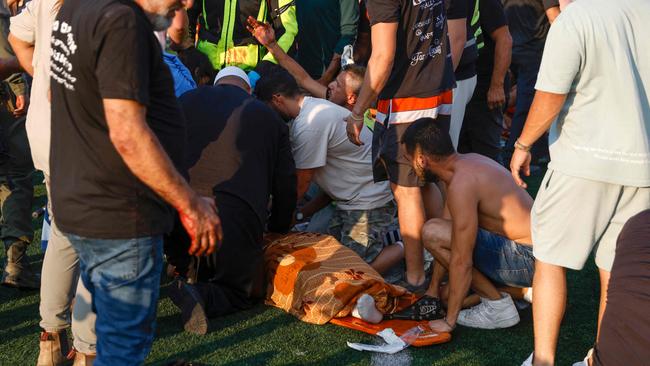
Hezbollah, the terrorist group located in southern Lebanon, denied responsibility, but the Israeli government has attributed the attack to Hezbollah.
The terror group has kept up a nearly constant but relatively low-level barrage of rocket fire against northern Israeli towns since October 7.
This has greatly disrupted Israeli life, with some 80,000 Israeli citizens displaced from their normal homes and towns. Most of these people are living in limbo, many accommodated by the Israeli government in hotels.
Israel cannot tolerate this situation indefinitely.

That is one of many reasons, the humanitarian considerations being the most obvious, why so many people have argued for a swift ceasefire in Gaza. The thought was that it would be harder for Hezbollah to continue these attacks if there were a ceasefire in Gaza.
Nonetheless, until now it has seemed that both Hezbollah and Israel have wanted to avoid an all-out war.
For Israel, the reasons for this are obvious. It has been conducting a military operation in Gaza for months now. Many of its soldiers are severely tired. The mobilisation of soldiers for the Gaza operation has had a disruptive effect on the Israeli economy.
Hezbollah is militarily a much more formidable foe than Hamas in Gaza.
The disruption in Israel of a Hezbollah war would be severe.
It is believed Hezbollah has some 150,000 rockets in its arsenal. Some of these are homemade. But an increasing number are high-impact, precisely directed and made in Iran.
Even Israel’s iron dome missile defence system cannot intercept all rockets, as this deadly attack on the Druze village of Majdal Shams demonstrates.

The carnage and Israel-wide dislocation that would come from an Israel-Hezbollah war is a major disincentive for Israel itself initiating a wider conflict.
But Israel must have confidence that its deterrence is effective. This has in the past been given expression in a doctrine of asymmetric response.
The consequences for Hezbollah, and its sponsor, Iran, of a large-scale conflict would also be fearful.
Iran treats Hezbollah with much more respect and consideration than it shows towards any of its other proxy forces.

Iran is happy to fight Israel to the last Palestinian, the last Houthi, the last Syrian or Iraqi.
But Hezbollah has a special place in Iran’s calculations. It is the biggest and most powerful of all Iran’s proxies and it offers in some measure a last line of defence and deterrence for Iran against an Israeli strike against Iran’s nuclear program, or other Iranian targets.
Iran could not stop Israeli missiles from getting through. But it could fire its own missiles back and also, through Hezbollah, rain down destruction on Israel’s north.
Up till now, Iran has not wanted to use up that Hezbollah deterrent.
It’s also the case that if the southern Lebanon homeland of Hezbollah ends up looking like Gaza, the Lebanese will hate Hezbollah. Many Lebanese already detest it but cannot do anything about it.

Nonetheless, you don’t fire rockets with 50kg payloads without planning to kill a lot of people.
So what was going through Hezbollah’s mind when it launched this attack?
It is at least barely possible that this is a test for the Biden administration in its dying days, and particularly a test for Kamala Harris.
Washington would surely back Israel strongly in any war with Hezbollah.
But this backing would upset the Democratic Party left. Could Hezbollah conceivably be trying to hurt Harris politically?
It’s hard to imagine a context in which the US becomes heavily involved militarily in an Israel-Lebanon war, although Washington could well move naval resources to the area to underline deterrence of Iran, to make sure that Iran itself did not attack Israel.
Perhaps Hezbollah wanted to humiliate Israeli Prime Minister Benjamin Netanyahu during his visit to the US.

The subsequent Hezbollah denial of responsibility for the attack could indicate that, for once, it is operating at cross purposes with its Iranian masters.
It’s just possible that although Hezbollah is generally a hierarchical and disciplined organisation, someone overstepped the mark.
Or the denial of responsibility could be a way of trying to limit Israel politically, while testing its tolerance for punishment to the limit.
Netanyahu has said Israel will respond in a way that Hezbollah has not experienced before.
These are ominous words. This is an ominous situation.






The Lebanese strike on a northern Israeli village, located in the Golan Heights, brings Israel closer to outright war with a powerful neighbour than at any time since the October 7 Hamas terror attacks initiated the conflict in Gaza.